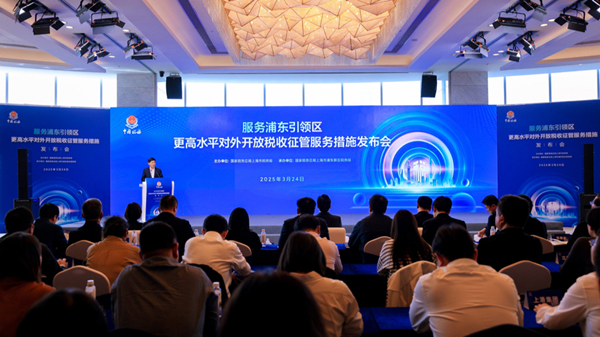Shanghai launches new tax measures for Pudong to boost opening-up

A view of Shanghai's Pudong New Area. [Photo by Wang Gang/China Daily]
The Shanghai Municipal Tax Service of the State Taxation Administration announced 11 tax service measures in Pudong New Area on March 24.
These measures, aimed at improving tax collection and administration, focus on three key areas — injecting momentum into foreign trade, enhancing the appeal of foreign investment, and adopting an innovative approach to tax services.
Unveiled at a news conference, the measures prioritize the implementation of export tax rebates for cutting-edge sectors such as satellite launches and in-orbit delivery services, mid-to-high-end spacecraft maintenance, and cross-border pilot training.
They aim to elevate the competitiveness of the large aircraft industrial park and accelerate green transformation in shipping by supporting tax rebates for green methanol and other eco-friendly marine fuels.
"Export tax rebates are among the most critical tax policies directly linked to foreign trade," said Sun Hui, an official from Pudong New Area tax bureau in charge of import and export tax.
By advancing rebates for emerging trade forms, the bureau aims to bolster the resilience of Pudong's industrial and supply chains.
The measures highlight the continuance of a preferential policy for offshore trade.
The policy, launched in April 2024, has been in effect in the China (Shanghai) Pilot Free Trade Zone and the Lin-gang Special Area. It exempts stamp duties for enterprises engaged in offshore trade.
According to statistics provided by the tax authorities, the policy has benefited over 700 enterprises by the end of 2024, leading to tax cuts of approximately 138 million yuan ($19.01 million).

The Shanghai Municipal Tax Service of the State Taxation Administration launches 11 tax measures in Pudong New Area to boost higher-level opening-up on March 24. [Photo/Shanghai Observer]
On the same day, the Shanghai Municipal Tax Service also inaugurated two physical service stations to provide tailored tax advisory services and policy guidance for cross-border businesses and foreign-funded projects.
Highlights:
Strengthen the deferred tax policy in order to promote the reinvestment of profits earned by foreign-funded enterprises in China.
Focus on key foreign-funded enterprises or projects; provide pre-determined services that allow non-resident enterprises to enjoy certain treaty benefits; enhance the stability of the foreign investment environment.
Focus on industrial development in the Pudong New Area; vigorously promote the negotiation and signing of unilateral and bilateral advance pricing agreements; and enhance operational stability to attract enterprises.
Accurately address the tax-related needs of international economic organizations; provide targeted tax services that enhance convenience; help create a favorable tax environment that encourages international economic organizations to establish local branches.
Provide diversified and personalized invoice use cases for foreign trade and foreign-funded enterprises.
Promote the trial implementation of on-demand invoicing services for foreign trade and foreign-funded enterprises with good credit; remove the invoice quota restrictions for high-credit enterprises.
Build a multilingual service system; improve intelligent tax and fee online consultation in nine foreign languages to meet the diverse needs of cross-border taxpayers.
Source: Shanghai Observer
 Contact Us
Contact Us

 Brilliant light show to illuminate Huangpu River
Brilliant light show to illuminate Huangpu River Maple leaves paint splendid scenery in Pudong
Maple leaves paint splendid scenery in Pudong Appreciate alluring lotus blossoms in Pudong's Century Park
Appreciate alluring lotus blossoms in Pudong's Century Park New pedestrian street boosts Pudong's night economy
New pedestrian street boosts Pudong's night economy 


